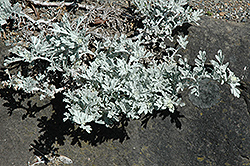>> Home
Height: 20 inches
Spread: 24 inches
Sunlight:
![]()
Hardiness Zone: 3a
Other Names: Beach Wormwood, Sage, Mugwort
Description:
Beautiful lacy silver foliage is valued for its texture and contrast in the garden; this variety attracts wildlife and is resistant to deer; does best in poor, dry soils, an ideal groundcover for adverse conditions where little else will grow
Ornamental Features
Dusty Miller's attractive tomentose ferny leaves remain grayish green in colour throughout the season on a plant with an upright spreading habit of growth.
Landscape Attributes
Dusty Miller is an herbaceous perennial with an upright spreading habit of growth. It brings an extremely fine and delicate texture to the garden composition and should be used to full effect.
This plant will require occasional maintenance and upkeep, and is best cleaned up in early spring before it resumes active growth for the season. Deer don't particularly care for this plant and will usually leave it alone in favor of tastier treats. Gardeners should be aware of the following characteristic(s) that may warrant special consideration;
- Spreading
- Self-Seeding
Dusty Miller is recommended for the following landscape applications;
- Mass Planting
- General Garden Use
- Groundcover
- Naturalizing And Woodland Gardens
Planting & Growing
Dusty Miller will grow to be about 20 inches tall at maturity, with a spread of 24 inches. Its foliage tends to remain dense right to the ground, not requiring facer plants in front. It grows at a fast rate, and under ideal conditions can be expected to live for approximately 10 years. As an herbaceous perennial, this plant will usually die back to the crown each winter, and will regrow from the base each spring. Be careful not to disturb the crown in late winter when it may not be readily seen!
This plant should only be grown in full sunlight. It prefers dry to average moisture levels with very well-drained soil, and will often die in standing water. It is considered to be drought-tolerant, and thus makes an ideal choice for a low-water garden or xeriscape application. It is particular about its soil conditions, with a strong preference for clay, alkaline soils, and is able to handle environmental salt. It is highly tolerant of urban pollution and will even thrive in inner city environments. This species is not originally from North America. It can be propagated by division.
